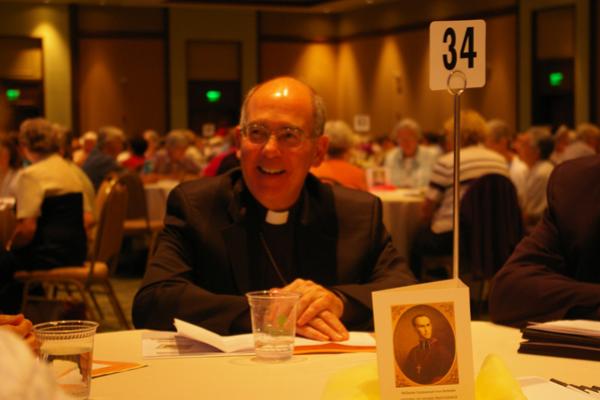Licensed therapists are banned from using conversion therapy to try to change a child’s sexual orientation from gay to straight under a bill Gov. Chris Christie signed Monday, making New Jersey the second state to prohibit the practice.
But a national Christian legal group that blocked an identical law from taking effect in California earlier this year vowed to sue New Jersey, saying the legislation violates the First Amendment rights of parents and therapists.
The new law prevents any licensed therapist, psychologist, social worker or counselors related to these professions from using sexual orientation change efforts with a children under age 18.
U.S. Catholic nuns — accused by Rome of “radical feminism” for advocating social justice at the expense of issues such as abortion, gay marriage, and euthanasia — responded to a Vatican knuckle rapping with a brief, conciliatory statement on Monday.
After its four-day annual assembly, the board of the Leadership Conference of Women Religious, which represents 80 percent of the nation’s 57,000 sisters, emphasized the positive, and remained tight-lipped about negotiations to resolve the investigation.
Reza Aslan begins of his book, Zealot: The Life and Times of Jesus of Nazareth, with a prescient warning: “Scholars tend to see the Jesus they want to see. Too often they see themselves—their own reflection—in the image of Jesus they have constructed” (xxxi).
I don’t think Aslan had himself in mind when wrote that statement, but you should be warned: the Jesus in Zealot is Aslan’s own false construction.
His central thesis is that the Jesus of history, and the God Jesus believed in, demanded violence in the face of political and religious oppression. Here’s one of the relevant passages:
[F]or those seeking the simple Jewish peasant and charismatic preacher who lived in Palestine two thousand years ago, there is nothing more important than this one undeniable truth: the same God whom the Bible calls a “man of war”(Exodus 15:3), the God who repeatedly command the wholesale slaughter of every foreign man, woman, and child who occupies the land of the Jews, the “blood spattered God” of Abraham, and Moses, and Jacob, and Joshua (Isaiah 63:3) the God who “shatters the heads of his enemies,” bids his warriors to bathe their feet in their blood and leave their corpses to be eaten by dogs (Psalm 68:21-23)—that is the only God that Jesus knew and the sole God that he worshipped. (122, emphasis in the original.)
The problem that I have with this passage is indicative of the problem that I have with the way Aslan constructs his Jesus. He constantly picks and chooses which verses from the Bible he uses to support his claim that Jesus was a warrior messiah whose goal was to violently overthrow the Roman and religious establishment. He peels away all passages that conflict with his construction so that he can show us what Jesus was truly like.
Well, what Aslan thinks Jesus was truly like.
A new study of almost a century’s worth of data shows that the smarter you are, the less likely you are to believe in God.
The study, conducted by Miron Zuckerman, a psychologist at the University of Rochester, examined the findings of 63 earlier studies — one dating back to the 1920s — that measured intelligence and religiosity. The majority of those studies found that more intelligent people were more likely to lack religious beliefs.
“The relation between intelligence and religion is negative,” Zuckerman said. “It was very early in the study that we realized that.”
But Zuckerman is careful to point out that his work — known as a “meta-study” because it examines a range of other studies — does not mean only dumb people believe in God.
Rather, he said, it shows only that more intelligent people may have less need for religion.
Wither Walter White?
How the morality tale of a cancer-stricken chemistry teacher who transforms himself (first by desperation and then through sheer hubris) into a cold-blooded, Machiavellian drug kingpin will end is what legions of fans of AMC’s Emmy-winning Breaking Bad want to know.
But after the first episode of the series’ final season aired on Aug. 11, the answer to what happens to Walter White (Bryan Cranston) remains a mystery — at least for another seven weeks.
Since its debut in January 2008, Breaking Bad has taken its audience on a spiritual journey — following Walt’s soul on a slow, steady descent into a hell of his own creation.
“Fleeting moments of possible restoration for Walter occur throughout the series,” Blake Atwood writes in the new book The Gospel According to Breaking Bad, which was released as an e-book to coincide with the season premiere.
Egypt now teeters on the edge of an abyss. Sen. John McCain (R-Ariz.), who was in Cairo earlier this month at President Obama’s request to mediate between the military-backed interim government and supporters of ousted President Mohammed Morsi, told CBS News: “Oh my God, I didn’t know it was this bad. These folks are just days or weeks away from all-out bloodshed.”
The widely anticipated military crackdown against pro-Morsi demonstrators began last week, so we’d better brace for the blow-back.
The rising specter of repression in Egypt is difficult to watch for two reasons. First, it confirms that the counterrevolution is successfully restoring the deep state — the vast security apparatus upon which military autocracy in Egypt has been based since Gamal Abdel Nasser’s rule in the 1950s, effectively extinguishing any hope of transition to democracy. Second, the violent crackdown evokes bad memories of earlier efforts by Egypt’s military strongmen to crush their Islamist opposition.
We know neither her name nor the location from which she comes. All we know is that she was “a woman with a spirit that had crippled her for eighteen years,” and that, “[s]he was bent over and was quite unable to stand up straight.” (Lk. 13:11) We don’t know from the text exactly what causes this spirit to lash out at this woman. We do know, though, the power of this spirit is to slowly and deliberately destroy this woman’s life. Whether this spirit manifesting its wicked power in this way is a result of the woman’s sinfulness or was it simply the way she was born we do not know. So weighted down by its power is she that she can’t “stand up straight.”
All we know is that bent over, exhausted, worn, and arid from the despair that comes from the power of this spirit, pushed to the margins of society, and dead inside, this woman comes in from the heat of the day to seek shelter in the synagogue.
They are nameless when they arrive at Magdalene. Seeking shelter – relief – from the power of the spirit whose work it had been to destroy them through drugs and prostitution, they come completely exhausted and desperate. Like the woman in the text, these women of Magdalene live on the edge between death and life. Living in the shadows, under the oppressive weight of the spirit whose power it had been to press the life right out of them, these women, like the woman in this text from Luke, “can’t stand up straight.”






